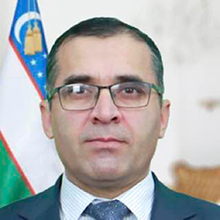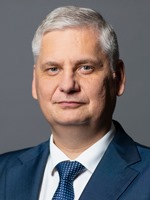Uzbekistan is creating its own model for combating corruption[Over]  Qodir Djuraev, MP, Legislative Chamber of Oliy Majlis (national parliament) of the Republic of Uzbekistan
Qodir Djuraev, MP, Legislative Chamber of Oliy Majlis (national parliament) of the Republic of Uzbekistan
One of the most crucial issues in the rapidly changing world is undoubtedly corruption. The human history suggests that this phenomenon brought even the most powerful nations to the brink of collapse.
Corruption is a perilous misfortune with negative impact on the entire human race, on foundation of any state and society, economic development; it undermines rule of law and sharply weakens public confidence in government, hinders advancement of democratic institutions.
Unfortunately, this problem has not been alien Uzbekistan. Until very recently, the latter had been known as one of those countries with highest perceptions of corruption.
READ MORE
- Friday, 9 February 2024, 19:54
Strategic Abstention: The ‘Axis of Resistance’ Deliberate Inaction in Gaza[Over]
 By Fuad SHAHBAZOV, Baku-based independent regional security and defence analyst By Fuad SHAHBAZOV, Baku-based independent regional security and defence analyst
Amid the escalating Gaza war, a striking absence marks the regional conflict landscape: the non-involvement of the ‘Axis of Resistance,’ including Iran and its proxies. Nearly six weeks into the war, these forces have consistently communicated their decision to remain on the sidelines. This inaction comes into sharp focus against the backdrop of Iran’s strategy to leverage non-state actors like Hezbollah and Hamas in its proxy warfare. While Hezbollah’s leader, Hassan Nasrallah, clarified their stance in a much-anticipated speech a month into the conflict, the impact of this abstention is profound. Israel, grappling with internal divisions and security vulnerabilities heightened by Hamas’s attacks, finds itself in a precarious position not seen in decades.
READ MORE
- Tuesday, 5 December 2023, 13:02
Georgia is Losing, and Losing Badly[Over]  Interview by “Georgia Today” with Eugene KOGAN, Tbilisi-based defence and security expert Interview by “Georgia Today” with Eugene KOGAN, Tbilisi-based defence and security expert
Georgia is not ready to defend itself if Moscow decides to invade again. And this is a very big weakness, one which should have been solved years ago and remains unresolved to this day…In Georgia, they don’t bother to ask themselves difficult questions…it’s something Georgian politicians seem to be averse to – Eugene Kogan, a researcher at the Vienna Institute of International Politics, an expert on defence and security issues in Eastern Europe and the Middle East, who has been living in Georgia for the past 10 years, told RFE/RL’s Georgian Service. We spoke to him about the role of Georgia in the region, territorial integrity, Karabakh, and the new war in the Middle East. We started with the Israel-Hamas conflict. READ MORE
- Thursday, 26 October 2023, 08:30
Putin and the 2022 Russian Military Conflict in Post-Soviet Lands[Over]  By Alan WHITEHORN, Professor Emeritus in Political Science, The Royal Military College of Canada By Alan WHITEHORN, Professor Emeritus in Political Science, The Royal Military College of Canada
Coming to power after the break-up of the Soviet Union in the 1990s, Lukashenko had ruled Belarus in a highly autocratic fashion for almost three decades, while seeking to navigate his country within Moscow’s sphere of influence. However, the aging leader’s arbitrary rule began to teeter and he faced a major challenge in the election of 2020. When skewed and rigged election results were announced, hundreds of thousands of voters of Belarus peacefully protested their strong objections.
The West echoed moral support to the mass of citizens voicing democratic demands on the streets, but provided little material assistance. Somewhat optimistically and naively, the West trusted that the unarmed people would peacefully prevail over the coercive might of the internal and external dictators in Minsk and Moscow. Putin, by contrast, sensing a vulnerable and weakened regime, provided his fellow authoritarian colleague with external assistance to forcefully crush the peaceful demonstrators. READ MORE
- Thursday, 17 March 2022, 07:54
Are We Seeing a New National Strategy on Human Rights Emerging in Uzbekistan under President Mirziyoyev?[Over]  Embassy of the Republic of Uzbekistan in the Kingdom of Belgium Embassy of the Republic of Uzbekistan in the Kingdom of Belgium
On June 22, 2020, the President of the Republic of Uzbekistan, Shavkat Mirziyoyev, signed a Decree on Approval of the National Strategy of the Republic of Uzbekistan on Human Rights. Much has been said about Uzbekistan’s efforts to reform and modernize multiple aspects of society and economy since Mirziyoyev became president in 2016. Human rights are a core area of national reform, in this respect. It should be noted from the outset that discussions around this subject in Uzbekistan during the early years of the country’s independence have not always focused on the most celebrated factors.
READ MORE
- Wednesday, 7 April 2021, 22:37
Russia and Eurasian Dilemmas[Over]  By Sergey Markedonov, Leading Researcher, MGIMO Institute
By Sergey Markedonov, Leading Researcher, MGIMO Institute
Future historians will definitely christen the year 2020 as the worldwide onset of coronavirus. It seems like tons of research articles and expert reports on the impact of the pandemic on the global economy and international political processes have been published. However, it is quite obvious that with the focus having been shifted towards the global perspective, the processes taking place in individual countries and regions appear to be falling out of sight. In the meantime, all of the conclusions drawn about the comprehensive implications of COVID-19 will remain somewhat schematic and generic without due consideration of their nuances and peculiarities. READ MORE
- Thursday, 4 June 2020, 21:47
Will the Syrian Kurds Strike a Deal with Moscow?[Over]
 By Fuad Shahbazov, Baku-based independent regional security and defence analyst By Fuad Shahbazov, Baku-based independent regional security and defence analyst
President Donald Trump’s announcement at the end of 2018 that he would withdraw U.S. troops from Syria came as a surprise to all parties involved, sparking particular concerns among America’s Syrian Kurdish allies. The move followed President Trump’s declaration of victory over ISIS after a four-year military campaign fighting alongside Syrian Kurdish forces. This sudden and unexpected decision has been widely criticized not only by allies but also inside the White House, with many analysts arguing that the U.S. withdrawal will expose the Syrian Kurds to an attack by Turkey READ MORE
- Wednesday, 6 February 2019, 07:26
Ceasefire Violations Down as Armenia and Azerbaijan Implement South Caucasus Study Group Recommendation[Over] By EGF Editorial Staff
Since the end of October 2018, a new operative communication line (crisis hotline) has been established between Armenia and Azerbaijan, two countries that have been at war over the status of Nagorno-Karabakh (NK), a region recognized as Azerbaijani by the International Community, but inhabited by a majority Armenian population.
According to official sources from both sides, the level of military tension on the Line of Contact (LoC) between the conflicting parties has significantly decreased (from about 90 reports of ceasefire breaches/day, to about 20 reports/day). The opening of this new communication channel had been agreed several weeks before by the president of Azerbaijan, Ilham Aliyev, and the Prime-Minister of Armenia, Nikol Pashinyan, during an informal meeting held in the margins of the CIS summit in Dushanbe (Tajikistan) on 27-28 September 2018. READ MORE
- Tuesday, 11 December 2018, 06:39
|
|